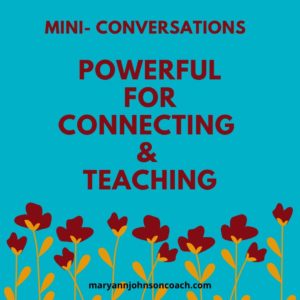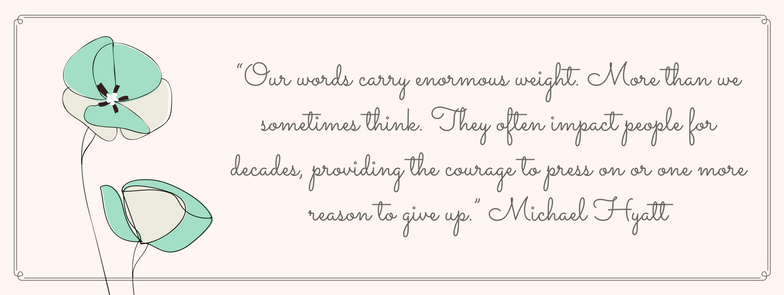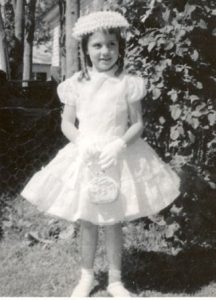 Since the schools closed, I have been helping my grandchildren with their schoolwork. Their work is online. A learning curve for me! : ) My eight-year-old grandson is a competent student. When he isn’t doing actual schoolwork, he is busy teaching himself about aerodynamics, science, and math. He is a smart little guy. However, each day that I have been called upon to help him, when I say, “Ben, let’s get your schoolwork done,” he replies, “I don’t know what to do.” That statement isn’t true. He knows how to log on. He knows where to find the modules, and his teacher has made a video for walking him through. I realized what he means is, “I need some direction. Get me going.”
Since the schools closed, I have been helping my grandchildren with their schoolwork. Their work is online. A learning curve for me! : ) My eight-year-old grandson is a competent student. When he isn’t doing actual schoolwork, he is busy teaching himself about aerodynamics, science, and math. He is a smart little guy. However, each day that I have been called upon to help him, when I say, “Ben, let’s get your schoolwork done,” he replies, “I don’t know what to do.” That statement isn’t true. He knows how to log on. He knows where to find the modules, and his teacher has made a video for walking him through. I realized what he means is, “I need some direction. Get me going.”
Right after this conversation, we had a second conversation. I said, “Get your iPad, entry code, and paperwork and meet me at my house.” He replied, “I don’t know where they are.” I said, “Ben, you do know what to do. What I think you need is direction. So, I don’t want you to say that you don’t know what to do anymore. Say, Grandma, I need direction. And Ben, it’s your responsibility to know where your stuff is. Let’s find a spot for you to put it in my house, and then you’ll always know where it is.”
Although it will probably resolve these two issues eventually, there was a big problem with this morning’s exchange, and I should know better!
Mini Conversations Vs Mini Lectures
When talking to kids, mini conversations are far more effective than mini-lectures. What Ben got this morning was a mini-lecture. It took all of three minutes, but it was still a lecture.
When he finished his work, he put his book in the spot we decided upon and took his papers to his house. When I called him back and reminded him to put his papers in the same place so that he would know where they were, he said, “Oh, I didn’t know you meant the papers.” My best-educated guess is that tomorrow he will say, “I don’t know what to do” and need reminding that he does know and needs some direction. Mini lectures rarely sink in on the first go-around. Mini conversations, however, are far more effective when teaching. So, what is the difference?
The Purpose of a Mini Conversation
The purpose of a mini conversation is to listen and then teach, if you need to teach. Sometimes you share cool stuff, sometimes kids share cool stuff, and you stay present and listen through it all. Mini conversations always feel agreeable to both parties! They never feel like a lecture. A mini conversation will go miles in helping your lessons sink in. What would it have looked like if Ben and I had had a mini conversation this morning rather than a mini-lecture?
“Ben, it’s time to do your schoolwork.”
“I don’t know what to do.”
“That’s interesting. Didn’t you figure it out yesterday?” “Yea, but today I’m not sure what to do.”
“What would help?”
“I don’t know.”
“Let’s open your tablet and look at the modules and see if we can figure it out. OK?”
We would do what we do every day, and then I could say, “Ben, see, you do know what to do. Now you won’t have ever to say “I don’t know” again. High Five buddy.”
And what about the second part, not knowing where his school supplies are.
“Ben, get your tablet and papers and meet me in my house.”
“Grandma, I don’t know where they are.”
“That seems to be a problem every day, Ben. What can we do about it?”
“I don’t know.”
“Hmmm, let’s see. What if you had a spot in my house to keep them. Do you think that would help?”
“Yea, that would help me.”
“I think I have the perfect spot. See this basket on the stairs. I keep the book I read to grandpa and great-grandma here, so I always know where it is. Would that work.”
“Yea, that will work.”
“Ben, what do you think you need to put in here when you finish your schoolwork?”
“My reading book.”
“What else.”
“Oh, I could put my papers and my code in there.”
“Yea, that’s good. Then you won’t ever have to say I don’t know where my stuff is again. High five. We are Rockin this, Ben.”
Mini Conversations Are Powerful In Connecting With Kids
Can you see the difference? It not only sounds different; it feels different. There isn’t any recrimination. No shame. No judgment. Just solutions. And here’s another thing. Ben would have bought in. When kids buy into something new, a system or way of being, they take more ownership, and they remember to do it more often.
I’ll bet you also noticed that this mini conversation would probably have taken more than 3 minutes. Yup, it would have taken at least five or six. But if it relieved you of hearing lame responses and having to remind over and over, wouldn’t it be worth the three extra minutes.
Mini- conversations are powerful in connecting with our kids, and they are powerful when we want to teach.



 My daughter Kate wore shoes that were a size too big for many years after she became a teenager. I didn’t realize she was doing that. In fact, she was married before I found out. Her husband found out first and he called her on it.
My daughter Kate wore shoes that were a size too big for many years after she became a teenager. I didn’t realize she was doing that. In fact, she was married before I found out. Her husband found out first and he called her on it. years into my adulthood. She owned a Sweet Shop in Afton, Wyoming. I loved going there and she would let me work the candy counter and bag popcorn.
years into my adulthood. She owned a Sweet Shop in Afton, Wyoming. I loved going there and she would let me work the candy counter and bag popcorn. Not only did I begin believing I was fat, I believed that I must be really unattractive because I was fat. But when I was seventeen I was at the home of a woman who was doing some alterations on a dress for me. Her husband told me that I had the most beautiful brown eyes. I know that it seems incredible because I didn’t even know the man, but I believed him. I had beautiful eyes! Even now at 65, when I look into the mirror I think to myself, “Man, you have beautiful eyes.”
Not only did I begin believing I was fat, I believed that I must be really unattractive because I was fat. But when I was seventeen I was at the home of a woman who was doing some alterations on a dress for me. Her husband told me that I had the most beautiful brown eyes. I know that it seems incredible because I didn’t even know the man, but I believed him. I had beautiful eyes! Even now at 65, when I look into the mirror I think to myself, “Man, you have beautiful eyes.”